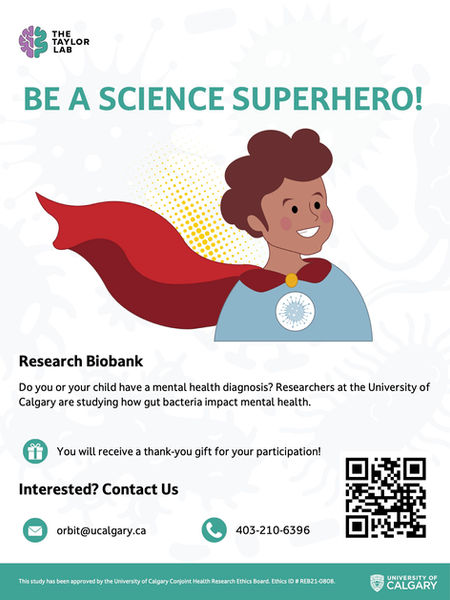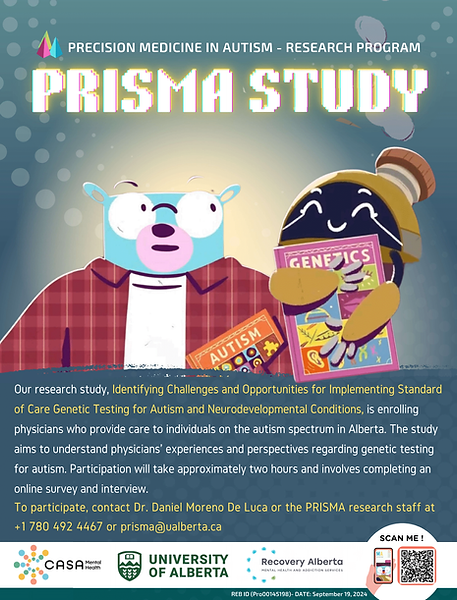
Research projects at the University of Calgary
Participate in research at the University of Calgary
Researchers from across the University of Calgary have ongoing research projects into child development. For more information on other research programs, visit the University of Calgary research participation page.
Research Projects
Cortical excitability and dopamine in ADHD
Many children are diagnosed with Attention-Deficit/Hyperactivity Disorder (ADHD) every year. Our goal is to understand which parts of the brain relates to children's feelings of impulsiveness, restlessness, hyperactivity, and trouble paying attention. To understand how these feelings relate to parts of the brain, we will use neuroimaging and non-invasive brain stimulation, known as theta burst stimulation (TBS). TBS uses transcranial magnetic stimulation to change cortical activity in attempts to change attention and impulsivity. TBS can be given intermittently or continuously, which and increase or decrease the excitability of the brain.
All children (ages 10 to 16 years) with and without ADHD are invited to take part in the study. Participants will complete cognitive tasks before and after a TBS session (~15 to 20 minutes) one of three different stimulation protocols to the right frontal lobe. This will help investigate the effect of TBS stimulation on cognitive skills and cortical excitability in children with ADHD.
The study has been approved by the University of Calgary Conjoint Health Research Ethics Board (REB23-0047).

Sleep and Problem Behaviours in Children with Autism
Many children with Autism have difficulties with sleep. Sleep difficulties have been linked with irritability, and mood difficulties. We would like to learn more about how sleep difficulties and Autism symptoms relate to problem behaviours in children.
We are recruiting children age 6-12 years of age with Autism Spectrum Diagnosis. Parents will answer questions online relating to Autism symptoms and behaviour difficulties. We will then mail the family an actigraphy device to wear for 7 days and a sleep diary to complete while the child is wearing the device.
This study has been approved by the University of Calgary Conjoint Health Research Ethics Board (REB21-1601).

Tailored Psychobiotics: A Microbiome Biobank for Mental Health Research
The purpose of this biobank is to collect stool, urine, saliva and blood (optional) samples and clinical data in order to study the microbes present in the gut in participants who have different mental and neurological disorders at 6 month intervals. Samples will be taken every 6 months for 2 years. How the microbiome changes over time and how that relates to mental health symptoms will be studied to inform possible treatment options.
Individuals ages 5 years and over with mood disorder (depression and bipolar disorder), Obsessive Compulsive Disorder, Post Traumatic Stress Disorder, Autism, Attention Deficit Hyperactivity Disorder, Eating Disorders or panic disorder are eligible.
The study has been approved by the University of Calgary Conjoint Health Research Ethics Board (REB21-0808).

Needs Assessment for Children and Youth with NDDs and Behavioural Complexity
We want to hear about caregiver's experiences advocating for their child's behaviours of concern in clinical settings.
By sharing your story as a caregiver, you can help us understand what it is like to seek help for your child's behaviours of concern and what those experiences have been for you.
To be eligible for this study, the participant needs to be:
-
Caregiver of a child or youth 3-18 years
-
Child with profoundly impacting NDD and behaviours of concern
-
Clinical appointment within the last 12 months
The study has been approved by the University of Calgary Conjoint Health Research Ethics Board (REB25-1398).

Mental Health 4 Kids Research Registry
This research registry connects young people and families with mental health research studies.
Here is how to sign up and what you can expect:
-
Use the link to get into the Research Registry information page. https://is.gd/mhresearch4kids
-
Provide Information: We will collect some information about how to contact you and some information about your mental health.
-
Connect: If there is a study that could be right for you, a research scientist will contact you with details about the study.
-
Choose: It is your choice to participate in any research study, you can say yes or no when a research scientist contacts you. Choose to participate in the studies that are right for you!
To be eligible for the research registr, the participant needs to be:
-
Aged 0-18 years
-
Children and adolescents who are currently seeking help for mental health concerns and/or neurodevelopmental disorders.


Randomized Placebo-Controlled Trial of Sertraline vs. Placebo in the Treatment of Anxiety in Children and AdoLescents with NeurodevelopMental Disorders: The CALM Study
This randomized controlled trial is to see the effects of a drug called sertraline on anxiety in children and adolescents with Neurodevelopmental Conditions / Disorders (NDDs): including Autism Spectrum Disorder (ASD), Attention Deficit Hyperactivity Disorder (ADHD), Tic Disorders, Fragile X syndrome, Tuberous Sclerosis, 22q11 deletions.
Though Sertraline has been studied in children, and adolescents with obsessive compulsive disorder (OCD) and with major depression, research is needed to confirm whether sertraline can help improve anxiety in children and youth with NDDs.
To be eligible for this study, the participant needs to be:
-
8-17 years old
-
Female youth who are sexually active and agree to use birth control
-
Have at least one diagnosis of ASD, ADHD, Tic Disorders, or a genetic diagnosis of Fragile X, tuberous sclerosis or 22q11 deletions
-
Have at least one of the conditions: Separation Anxiety Disorder, Social Anxiety Disorder, Agoraphobia, Generalized Anxiety Disorder, or Unspecified Anxiety Disorder.
-
Have some ability to speak.
-
If already receiving treatments, must meet the following criteria:
-
If receiving medication, must be on a stable dose.
-
If already receiving stable non-pharmacological behavioural treatments, have stable participation during 3 months prior to screening and will continue after finishing this research.
-
-
Proficient in speaking and reading English
-
Parent(s) / caregiver(s) willing to complete questionnaires about their child/youth

Identifying Challenges and Opportunities for Implementing Standard of Care Genetic Testing for Autism and Neurodevelopmental Conditions
This study is enrolling both children and adults diagnosed with autism, as well as physicians who provide care to individuals on the autism spectrum who reside in Alberta. The study aims to understand the experiences and perspectives of individuals on the autism spectrum, their families, and physicians regarding genetic testing for autism.
Participation will take approximately two hours and involves completing an online survey and an interview.

Transcranial Magnetic Brain STimulation for ANxiety and Depression in youth: Brain STAND project
The purpose of this study is to investigate the use of transcranial magnetic stimulation (TMS) for the treatment and investigation of anxiety and depression in youth referred by their doctor.
TMS is a non-invasive form of brain stimulation that sends magnetic pulses to a specific brain area. If appropriate, participants will receive 20 sessions of either intermittent theta-burst TMS or repetitive TMS over 4 weeks (Monday-Friday). Participants and their parent/guardian will also be asked to complete a series of tasks and/or questionnaires asking about symptoms, quality of life, and medication use.
To be eligible for this study, the participant needs to:
-
Be aged 6-18 years
-
Have a referral from a medical professional for consideration of treatment for anxiety or depression as diagnosed by a medical professional (pediatricians, subspecialty pediatricians, child and adolescent psychiatrists, child psychologists)
-
Have active anxiety and/or depression symptoms
-
If actively taking psycho-active prescription medication(s), no changes in medication for at least 3 months prior to entry into the study, with no anticipation of change in the frequency or dose over the duration of the study, unless changes to medication are required for participant safety.
Exclusion criteria:
-
Status epilepticus in past 12-months
-
Presence of disease, medical condition, or physical condition that, in the opinion of the study investigator may compromise, interfere, or limit the participant’s ability to complete the study
-
Hospitalization for suicide attempt within the past 3 months
-
TMS-related contraindications, such as implanted medical devices (e.g., pacemaker)
-
If actively taking prescription medication, no changes in medication for at least 3 months prior to entry into the study, with no anticipated change in the frequency or dose over the duration of the study, unless changes to medication are required for participant safety
-
Unable to understand instructions in English.

